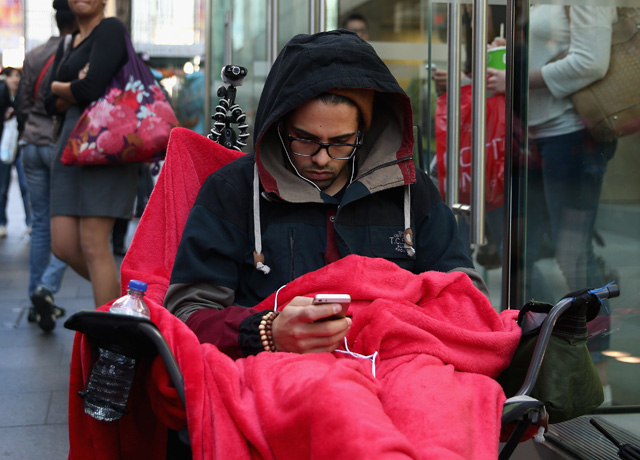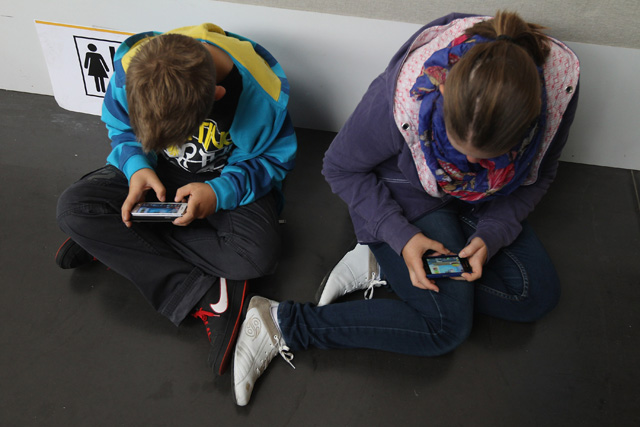
A smartphone fanatic is glued to his phone while camping out before the release of the iPhone 6 outside the Sydney Apple Store on September 18. (Getty)
In the future we will communicate only through our smartphones and Google Glass, using pulses in our brains to send messages. We’ll never need to speak again, as a like on Facebook or a retweet will form the basis of conversation and we’ll let friends know what we are doing by simply uploading photos on Instagram or creating a board on Pinterest and sharing.
Our hands will become clawed typing machines and our mouths obsolete except for consuming food and drink. Our pupils will become square to accommodate the numerous screens we view our lives through. In the end we won’t even have to leave the house. We can just lie in bed all day talking to people using technology and our income will come in through blogs.
Okay, maybe that’s a slightly exaggerated, dystopian image of the future, but we’re sure some technophobes out there do genuinely believe this is possible. The end is nigh and all that. An Arnold Schwarzenegger type is going to come back and kill us all. Our microwave oven is watching us. Etcetera etcetera.
That terrifying technological world would simply never happen. Sure we can currently look around in a moment of silence and find everyone at the dinner table engrossed in his or her smartphone; you’re probably reading this on one, but basic human interaction will always come out on top.
So don’t panic if you find yourself checking your smartphone 100 times a day — the average user is said to check 150 times, so you’re not doing too badly — or desperately searching for Wi-Fi connection when in a restaurant or bar. We’re all in the same boat.

(Getty)
However, it is probably best to limit your time spent on your phone when friends and family are around or if you’re watching a film with your partner, with a bottle of wine at the weekend — laughing every five minutes at something someone said on your Twitter feed and ignoring them probably won’t go down too well.
It’s true, though, we are all a little too reliant on our smartphones, but they are pretty damn useful. If you’re lost you simply open up Google Maps, if you’re bored you play a quick game of Candy Crush or partake in a flutter on Jackpot247, you don’t bother to take your camera out anymore or you simply don’t own one and if you’re having a debate with someone over the name of that actor in that film you turn to your phone for answers.
As useful as they are, the issue of smartphone addiction is now a trending topic of conversation. Nearly everyone now carries a handset around, which allows you to contact anyone and everyone you know immediately, take pictures and share them instantly and listen to music on the go. You can track everything you eat, monitor your exercise and sleeping patterns and even measure your heart rate now on most devices, using a variety of apps.
Smartphones get us hooked because we have access to information every minute of the day and we can become obsessed with sharing and validating everything we do. We’re all guilty of snapping a picture of our Starbucks and uploading it to Instagram or Twitter, genuinely believing that people will care (and be envious of) what we are doing at that exact moment in time.
Narcissistic tendencies are very easy to develop when in possession of a smartphone. Take, for example, the story of Danny Bowman, a normal teenage boy who became so obsessed with taking the perfect selfie that he would spend 10 hours a day trying to capture an image of himself that he was satisfied with. Selfie addiction is now becoming a recognized disorder, in this age of the smartphone, as it can lead to more serious issues such as body dysmorphic disorder and depression.

A model takes a selfie with Olivia Palermo backstage during Fashion Week Fall 2014 on February 8 in New York City. (Getty)
Go on pretty much any Instagram account and you will find image after image of the account owner’s face, usually angled in the exact same way but with different hairstyles, makeup or location.
The front-facing camera has made us all a little more anxious about how we look, not vainer as many would imply, we take these photos and share them with the world so we receive confirmation that other people find us attractive. It’s the same reason people sign up to online dating sites when they are in a relationship, just to see how much attention they receive. It’s not vanity, it’s severe anxiety over our looks and place in society.
Overuse of our smartphones could have an impact on our relationships, it can become a real distraction in those intimate moments when you are alone. Nothing is more off-putting than someone ignoring their partner to check their Facebook, keep up a conversation on Whatsapp or comment on something they’ve seen on Twitter.
If you are struggling with an addiction to your handset, as you live more in the virtual world than in the real one, you seek approval from strangers instead of the people around you who matter and spend so much time interacting behind a screen you can lose sight of how to communicate effectively in real life.
Addiction to technology doesn’t just limit itself to smartphones though of course, online gaming has also been the cause of extreme addiction and in some cases terrible tragedy, such as the Rebecca Collen Christie case. This case involved a mother becoming so obsessed with the fantasy role playing game World of Warcraft she completely neglected her 3-year-old daughter, who eventually died of malnourishment from her neglect.
This is an extreme example, yes, but an illustration of how a technology addiction can spiral completely out of control. The lesson here simply is to monitor your usage, don’t allow yourself to spend more than a couple of hours using your phone or computer.
Go outside, take a walk, visit relatives, if you need to buy something physically leave the house and go to the shop rather than relying on the online store.
So in the end, does it really matter if you are hooked to your smartphone? Well, the simple answer is if it isn’t impacting on your work and social life then no, keep on using that handheld device and have fun. However, if you are finding it hard to put it down or it is impacting on your relationships then maybe it’s time to seek advice and, dare we say it, press that off switch.
Comments
Smartphone Addiction: Are You Hooked & Does It Really Matter?